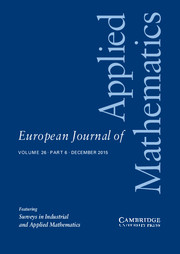Article contents
Deformation of an elastic substrate due to a resting sessile droplet
Published online by Cambridge University Press: 22 June 2017
Abstract
On a sufficiently soft substrate, a resting fluid droplet will cause significant deformation of the substrate. This deformation is driven by a combination of capillary forces at the contact line and the fluid pressure at the solid surface. These forces are balanced at the surface by the solid traction stress induced by the substrate deformation. Young's Law, which predicts the equilibrium contact angle of the droplet, also indicates an a priori radial force balance for rigid substrates, but not necessarily for soft substrates that deform under loading. It remains an open question whether the contact line transmits a non-zero force tangent to the substrate surface in addition to the conventional normal (vertical) force. We present an analytic Fourier transform solution technique that includes general interfacial energy conditions, which govern the contact angle of a 2D droplet. This includes evaluating the effect of gravity on the droplet shape in order to determine the correct fluid pressure at the substrate surface for larger droplets. Importantly, we find that in order to avoid a strain singularity at the contact line under a non-zero tangential contact line force, it is necessary to include a previously neglected horizontal traction boundary condition. To quantify the effects of the contact line and identify key quantities that will be experimentally accessible for testing the model, we evaluate solutions for the substrate surface displacement field as a function of Poisson's ratio and zero/non-zero tangential contact line forces.
Keywords
Information
- Type
- Papers
- Information
- Copyright
- Copyright © Cambridge University Press 2017
References
- 16
- Cited by

